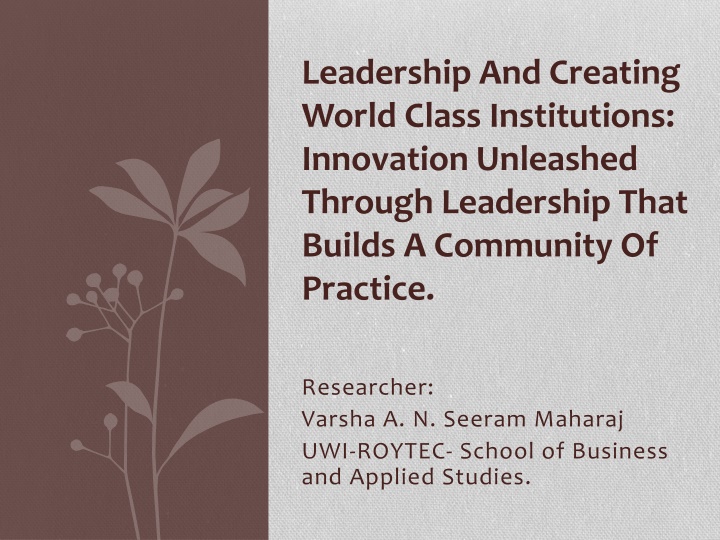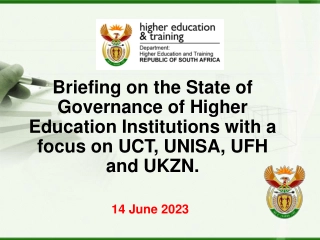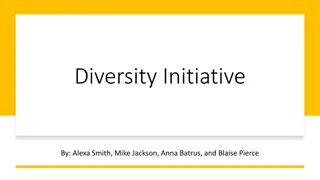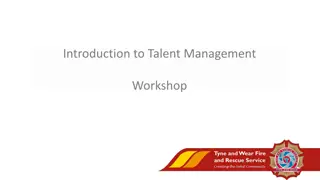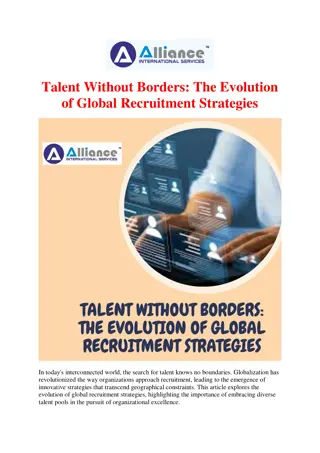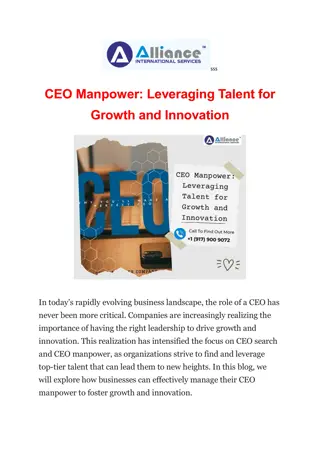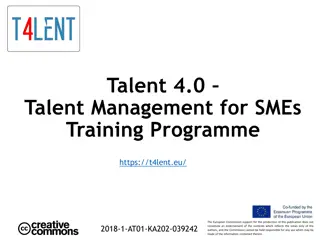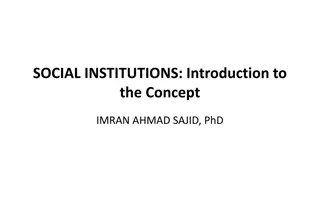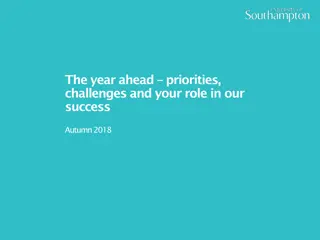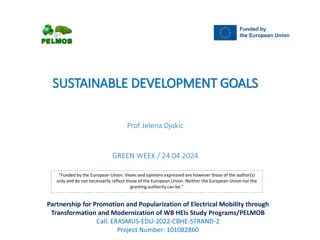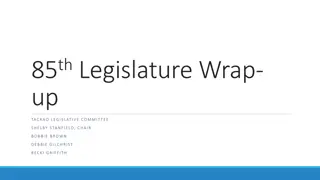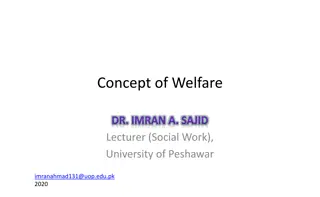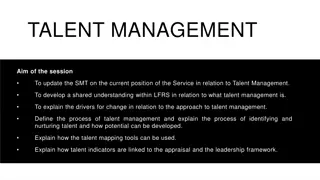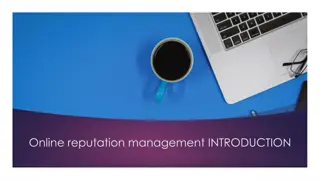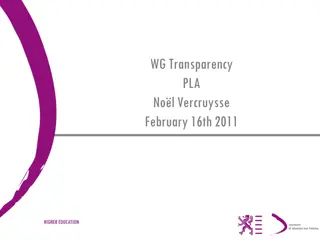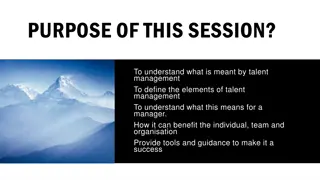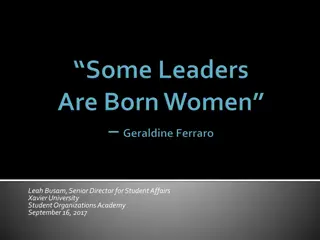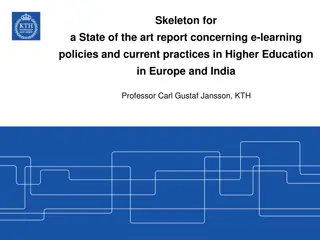Leadership for Building World Class Institutions: A Study on Talent Management and Reputation in Higher Education
Delve into the importance of reputation and talent management in higher education institutions, with a focus on developing global mindsets and strategies for building world-class universities. Insights from key figures in education highlight the evolving landscape and necessity for innovative leadership in creating renowned institutions like the University of the West Indies.
Download Presentation

Please find below an Image/Link to download the presentation.
The content on the website is provided AS IS for your information and personal use only. It may not be sold, licensed, or shared on other websites without obtaining consent from the author.If you encounter any issues during the download, it is possible that the publisher has removed the file from their server.
You are allowed to download the files provided on this website for personal or commercial use, subject to the condition that they are used lawfully. All files are the property of their respective owners.
The content on the website is provided AS IS for your information and personal use only. It may not be sold, licensed, or shared on other websites without obtaining consent from the author.
E N D
Presentation Transcript
Leadership And Creating World Class Institutions: Innovation Unleashed Through Leadership That Builds A Community Of Practice. Researcher: Varsha A. N. Seeram Maharaj UWI-ROYTEC- School of Business and Applied Studies.
Presentation Outline Importance of Reputation Justification of Topic Importance of Global Mind Set Why Develop Mindsets through Talent Management Structure of the University of the West Indies
Global Recognition: Importance of Reputation PHIL BATY Why is reputation so important? "Reputation is almost like the currency of higher education "It's the way scholars decide whom to do business with, whom to collaborate with and where they'll go for their next career move. "Reputation often comes out as the No. 1 factor that students use to decide where they want to go to school.
Dr. Michael Barber, Chief Education Advisor PEARSON Sir Michael Barber 1. The Chief Education Advisor of PEARSON and 2. Co-author of the 2013 policy report An Avalanche is Coming for the Institute of Public Policy Research in the United Kingdom an avalanche in higher education is coming, and when an avalanche comes, you can't stand still.
Justification of Study: WORLD CLASS STATUS & GOVERNANCE Figure 1 Lee (2013), A Framework for understanding the Development of Globally Recognized Universities/World Class Universities.
UWI: Definition of Talent Management The University of the West Indies (2012, p. 75) defines talent management as a CONSCIOUS DELIBERATE approach undertaken to attract, DEVELOP and/or retain people with the APTITUDE and abilities TO MEET current and FUTURE ORGANISATIONAL needs.
The University of the West Indies Evolved from a small college in Jamaica with only 33 students in 1948, to a regional recognized University, with well over 40,000 students in 2015. Largest, most recognized higher education provider in the Commonwealth Caribbean: consisting of four (4) campuses in Barbados, Jamaica, Trinidad and Tobago and the Open Campus. Faculty and students from more than 40 countries worldwide and also has collaborative links with 160 universities globally. Undergraduate and postgraduate degree options in Food & Agriculture, Engineering, Humanities & Education, Law, Medical Sciences, Social Sciences and finally Science and Technology.
Co-relation between Mindset & Enterprise Goals: Figure 2: Fitz-enz (2000, p.290), The connection between Human Resources to Enterprise Goals Human Resource Management Acquire Highly Skilled Employees (Global Outsourcing) Develop Competences for Key Positions Continuously Retain Human Capital Functional Higher Educational Objectives The Development of R&D Department, Production of Graduates that can be Globally Integrated, Increased Funding, Provision of High Quality Services, Focus on Adminstration's Contribution Enterprise Goals Attainment of Global Recognition, Efficiency in Human Resource, Increased Profits.
Different Administrators, Different Cultures, Different Values: ONE MISSION!
SCHWARTZ(1994): THEORETICAL MODEL OF RELATIONS AMONG MOTIVATIONAL TYPES OF VALUES.
Why develop a Global Mindset: Talent Management VISION OF THE UNIVERSITY OF THE WEST INDIES The University of the West Indies , Strategic Plan (2012-2107), this institution holds the vision to become globally recognized by 2017. NEUROLOGICAL STUDIES Bhanji & Beer (2012) in their study entitled: Mindset influences neural regions that represent value and choice stated that people s mindsets can influence the way they evaluate options and make choices. ACTT PRE CONFERENCE GUEST SPEAKER: DR. CAMPTON BORNE: (2015) I was shocked of the mindset of administrators in UWI (Making reference to the attitudes of administrators, with regards to the status of student application)
The University of the West Indies Structure Office 1: The Office of the Vice-Chancellor Office 2: The Office of Administration and Special Initiatives Office 3: The Office of the Board for Undergraduate Studies Office 4: The School for Graduate Studies and Research Office 5: The Office of Research Office 6: The Office of the Board for Non-Campus Countries and Distance Education Office 7: The Office of Administration (Office of the University Registrar) Office 8: The Office of Finance Office 9: The Office of Planning and Development Office 10: The Projects Office (formerly a part of the Office of Planning, it has merged with the Special Projects Unit) Office 11: The Management Audit Office Office 12: The Legal Unit.
RECOMMENDATIONS Implementation & Stakeholder Involvement Burrows (1999) suggested that higher educational institutions must identify their stakeholders, for any quality enhancement process. However, in a recent 2015 study, the Turku University of Applied Sciences, in Finland, Kettunen (2015, p.56), emphasises that stakeholder maps are vital in quality assurance, because higher education institutions must identify the most important stakeholders to collect feedback from the stakeholder relationships and improve their processes. As such, since the ACTT s, Quality Institute (TQI) is an initiative aimed towards facilitating high quality and relevant training to support higher education institutions, institutional personnel, quality assurance professionals and other stakeholders, this course should be added, to the institution s repertoire.
ACTTs: The Quality Institute (TQI) Professional Development for External Evaluators External Evaluator s Training Report Writing for Team Chairs Quality in Tertiary Education (QuiTE) Awards Workshop for Institutional Applications Calculating Credits and Determining the Level of Academic Programmes The Forensics of Academic Credential and CV Fraud Effective Teaching and Learning Programme Design and Development Designing Student Assessment Strategic Planning for Higher Education and Training Institutions Institutional Governance and Administration Transnational Programme Recognition Managing Institutional Finances Guiding the Self-Study Process for Institutional Accreditation Developing Policies for Higher Education Institutions Preparing the Self-Study for Registration Quality Management Systems for Institutional Effectiveness
A Domain Model of Competencies (Hogan & Kaiser, 2005). Intrapersonal Domain Interpersonal Business Leadership
End of Presentation Thank you for your attention. Your feedback will be much appreciated.
